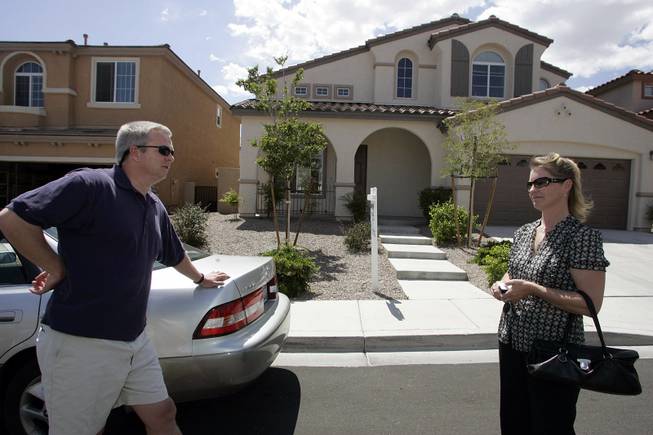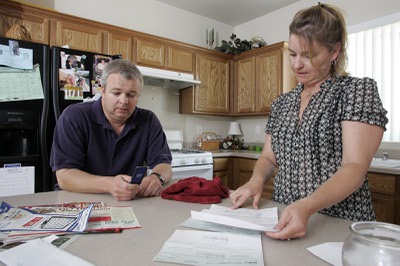
The Summerlin rental home where Dan and Peggy Montgomery live is their fourth since they moved to the Las Vegas Valley from upstate New York in late 2005. They found out the home they rented before this one was facing foreclosure when a real estate agent brought a client to look at the house, they said.
Tuesday, May 20, 2008 | 2 a.m.

Peggy Montgomery looks over a deposit refund check and documents from a property management company on her last rental home while her husband, Dan, tries to call the management office. The Montgomerys expected $1,500 but received $850 after deductions. After they moved from the home they lived in before that one, they got nothing back. And moving expenses have been about $1,000 each time, they say.
Sun Topic
Sun Archives
- Congress goes extra mile for homeowners (5-4-2008)
- HEY, BUYERS: ALL ABOARD! (3-02-2008)
- Subprime clean up: Sadness overwhelms (1-30-2008)
- Speculators bear brunt of foreclosures (9-23-2007)
Beyond the Sun
- Mortgage mess affects renters, too (4-10-2008)
- Foreclosure affects far reaching (2-21-2008)
- Wave of foreclosures hits renters (10-29-2007)
Peggy Montgomery fidgets as she waits for her husband to return from the mailbox, hoping he will be waving a refunded security deposit.
The Montgomerys were forced to move recently, through no fault of their own, for the third time in 18 months, so they need the money. With each move, they have paid about $1,000 in moving expenses, plus security and pet deposits.
“My husband and I live paycheck to paycheck,” says the 42-year-old patient services representative at the Nevada Cancer Institute. “We have cut many corners to keep our heads above water and most of all keep a roof over our family’s head.”
The foreclosure crisis has made that more challenging for the Montgomerys and many other renters across the Las Vegas Valley.
When foreclosure hits a rental property, the tenants usually get booted out in short order. That’s the most direct way renters can be affected, but it’s not the only way. If the owner of more than one home loses one property to foreclosure, for example, it can have a ripple effect on the renters in the landlord’s other homes.
Las Vegas financial analyst Jeremy Aguero says there is no tally of renters who have been forced out by foreclosures, but the total is likely to be considerable. About 25 percent of all homes in the Las Vegas Valley are rental properties, and so were 60 percent of the 12,800 valley properties — not just homes but also apartments, condos, etc. — that went into foreclosure last year, Aguero says.
After the foreclosure of 38-year-old Karen Rudder’s rented home, the secretary for her landlord’s lawyer told Rudder she empathized with her. “I’m going to rent a home and I’m afraid,” the secretary confided. Rudder says she ended up a creditor of her landlord, in bankruptcy court.
The biggest problem for renters is that a lease provides no safeguard against being evicted during foreclosure proceedings, even if the lease stretches beyond the date of foreclosure.
Foreclosure attorney Gregory Wilde says case law allows banks to evict any renter from a foreclosed home. Anything less “wouldn’t be fair to the banks” that are saddled with these homes by delinquent owners.
Banks and mortgage companies have the upper hand, Deputy Attorney General Ernest Figueroa agrees. “The mortgage company has the secured lien on the property,” he says. “Once they foreclose on it, they can do whatever they’d like to do.”
The renter could try to take the landlord to small claims court. But a foreclosure generally indicates the landlord is already in financial distress, so trying to collect on any judgment “could be an exercise in futility,” Figueroa says.
The laws aren’t stacked entirely against the renter, however. There is a little-known and seldom used tactic that renters can employ to try to ensure they are notified of the start of the foreclosure process, which usually takes about four months to complete.
If the renter records the lease, with the parcel number affixed, in the county recorder’s office, the bank assuming that property through foreclosure proceedings should come across the document. Apprised of the existence of the renter, representatives of the bank would then be expected to notify the occupants of the ongoing proceedings. Recording the lease costs $14 for the first page and $1 per additional page, plus $25 if the documentation isn’t in the format required by the recorder’s office.
Like most renters, the Montgomerys were unaware of this option. They just tried to cope with the uncertainty over how much longer they could stay in their houses while real estate agents and construction crews dropped by unannounced.
The landlords of the Montgomerys’ second house in Las Vegas effectively used that approach to push the Montgomerys out.
“They didn’t come right out and say, ‘You have to move,’ ” says Dan Montgomery, 43, a pit boss at the Sahara. “But the construction people kept coming by.”
The couple didn’t get a dime of their security deposit back that time.
With the Montgomerys’ third Las Vegas house, the realty company agreed to release them from their lease one month early.
They got part of the security deposit back, but they’re still pressing for the rest of it, $650.
Even if they eventually get all of that money, they said, it won’t compensate for the stress of repeatedly uprooting their family, including forcing their 12-year-old son to change schools three times. And it won’t end Peggy Montgomery’s longing for that last house, which she and her husband had hoped to eventually buy. She gets nostalgic when she describes the patio, a shaded concrete parallelogram under a second floor that juts out toward the lawn.
The modest two-story tract home awash in earth tones is nestled snugly in a sunny gated community, but a week-old newspaper decays in the driveway, the lone hint that life graced the property in the past seven days. The grass in the back yard is sparse and dying, if not already dead, and the dehydrated trees appear to be well on their way to the same fate.

Join the Discussion:
Check this out for a full explanation of our conversion to the LiveFyre commenting system and instructions on how to sign up for an account.
Full comments policy